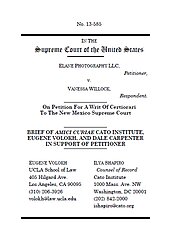Elane Photography v. Willock
Learn more about Cato’s Amicus Briefs Program.
While Cato believes in marriage equality, a commitment to egalitarian principles can’t justify the restriction of constitutionally protected fundamental rights like freedom of speech or association. Elane Photography, a Christian‐identified business in Albuquerque, declined to photograph Vanessa Willock’s same‐sex commitment ceremony based on the business owners’ personal beliefs. New Mexico law prohibits any refusal to render business services because of sexual orientation, however, so Willock filed a claim with the New Mexico Human Rights Commission. She argued that Elane Photography is a “public accommodation,” akin to a hotel or restaurant, that is subject to the state’s anti‐discrimination law. The commission found against Elane and ordered it to pay $6,600 in attorney fees. The state trial appellate courts ruled affirmed that order. The case then went before the New Mexico Supreme Court, where Cato, along with law professors Eugene Volokh and Dale Carpenter, filed an amicus brief urging the court to reverse the court of appeals. Our brief explained that photography, unlike many other wedding‐related businesses (e.g., caterers, hotels, limousine drivers), is an art form protected by the First Amendment—even if it’s not political and even if the photos are taken for commercial purposes. The U.S. Supreme Court ruled in Wooley v. Maynard—the 1977 “Live Free or Die” license plate case out of New Hampshire—that forcing people to speak is just as unconstitutional as preventing or censoring speech. The First Amendment “includes both the right to speak freely and the right to refrain from speaking at all.” Moreover, unlike true cases of public accommodation, there are abundant opportunities to choose other photographers in the same area. Alas, the New Mexico Supreme Court also ruled against Elane Photography, holding that the First Amendment only prohibits compelling an individual to speak the government’s message, and that even if the state law did infringe on Elane Photography’s speech rights, those rights could not be vindicated because they conflicted with Willock’s right to equal access to public accommodations. Cato, again joined by professors Volokh and Carpenter, has now filed a brief urging the U.S. Supreme Court to hear the case, because the New Mexico court’s reasoning is incorrect and incompatible with Wooley. The Supreme Court has never held that the compelled speech doctrine is only applicable when an individual is forced to serve as a courier for the message of another. Instead, the Court has said repeatedly that what the First Amendment protects is a “freedom of the individual mind,” which the government violates whenever it tells a person what she must or must not say. Forcing a photographer to create a unique piece of art violates that freedom of the mind. Our brief also argues that the New Mexico Supreme Court was wrong to hold that the First Amendment can be abridged if a state law creates a “new right” that the constitutionally protected expression allegedly violates. The U.S. Supreme Court has never allowed such operation of state law, and allowing the New Mexico court’s reasoning to stand would send a dangerous message to state legislators and courts that the Bill of Rights is merely a suggestion, not a rule.

This work is licensed under a Creative Commons Attribution-NonCommercial-ShareAlike 4.0 International License.
